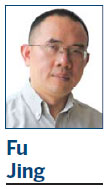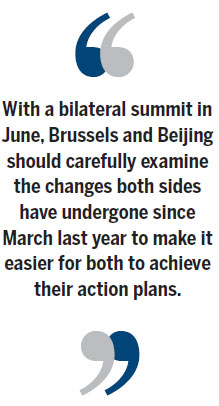A loose grasp of a changing world
Updated: 2015-04-03 07:28
By Fu Jing(China Daily Europe)
|
|||||||||||
As EU members throw support behind the new bank, Brussels must rethink its policy toward China
Following the depreciation of the euro, one euro now equals about 6.8 yuan (it fetched 8.5 yuan this time last year) and it is likely to lose more value in the near future.
This foreign exchange freefall underlines the dramatic changes that China and European Union have encountered since President Xi Jinping's visit to Europe in March last year, his first as president.
It also highlights a speech Xi gave at the end of that trip. At the College of Europe in Bruges, Belgium, on April 1, he laid out proposals to guide future bilateral ties.

It is now time to take stock of the changes both sides have made in the 12 months since Xi's visit while examining the proposals he announced in his speech that called on both sides to become partners of peace, growth and reform through a comprehensive strategic partnership.
First, let's see what the European Union has done since last year. There has been a major turnover in leadership in its three influential institutions: the European Parliament, European Commission and European Council.
Since the leadership reshuffle, the European Commission has unveiled a 315-billion-euro ($356 billion) investment plan to spur growth and its central bank has announced it will implement a quantitative easing monetary policy by September next year. These two moves have partly resulted in a weaker euro.
In China, the changes have been even more profound, with its leadership focused on an agenda of being clean. It has been reinforcing stringent anti-corruption measures to steer governments, officials and public servants away from corruption. It has also ushered in its new normal economic model that intentionally slows growth so as to restructure the economy and curb worsening environmental problems.
Xi has also made public his "One Belt, One Road" initiatives that in some respects mirror the development agenda of Europe.
In recent weeks, Western European powers, except Belgium, have agreed to become founding members of the China-led Asian Infrastructure Investment Bank, much to the dismay of the US. Austria, Denmark, Norway and Switzerland have also submitted applications to become founding members.
All of these changes have begun to shape a new context in the partnership between Beijing and Brussels and a new narrative to define the direction of bilateral ties.

With both sides preparing to mark the 40th anniversary of the establishment of diplomatic ties this year, Brussels should be more proactive in reflecting the strong will of its member countries to boost the relationship with Beijing to new levels.
Thus far, member countries such as the UK, Germany, the Netherlands and Luxembourg have voiced their support of China's proposal to establish the Asian Infrastructure Investment Bank. Brussels, on the other hand, says that because it is not a member of the World Bank and Asia Development Bank, it will not join China's initiative.
The current political and economic context differs widely from the time when the World Bank and the Asian Development Bank were established. Rapid changes have occurred in the EU. This requires swift changes in Brussels' mentality, which ordinarily follows in the footsteps of Washington, to take care of the interests of its member countries.
The EU's supportive attitude of the Asian Infrastructure Investment Bank is a reminder that Brussels should have a fuller grasp of the changing world as it designs its policies with regard to Beijing.
The EU is busy brewing up ideas to channel enough investment funds to create jobs and spur growth, while Xi has prioritized growth and reform in his agenda with Brussels as China works to design the blueprint for its 13th Five-Year Plan (2016-20).
Using the guidelines in Xi's speech last year, both sides could find as many convergences as possible to realize each other's policy targets. With a bilateral summit in June, Brussels and Beijing should carefully examine the changes both sides have undergone since March last year to make it easier for both to achieve their action plans.
The author is China Daily chief correspondent in Brussels. Contact the writer at fujing@chinadaily.com.cn
(China Daily European Weekly 04/03/2015 page13)
Today's Top News
54 dead after Russian trawler sinks in ocean
Death toll rises to 147 in Kenya university attack
Dozens killed in Kenyan university attack
Video of final seconds aboard Germanwings plane discovered
British Prince Harry reports for duty in Australia next week
Chinese World War II veterans to receive medals from Russia
Lufthansa insurers set aside $300 mln over crash
Sarkozy makes political comeback
Hot Topics
Lunar probe , China growth forecasts, Emission rules get tougher, China seen through 'colored lens', International board,
Editor's Picks

|

|

|

|

|

|






